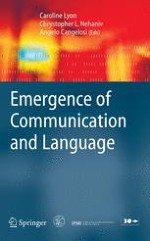2007 | OriginalPaper | Buchkapitel
7. The Recruitment Theory of Language Origins
verfasst von : Luc Steels
Erschienen in: Emergence of Communication and Language
Verlag: Springer London
Aktivieren Sie unsere intelligente Suche, um passende Fachinhalte oder Patente zu finden.
Wählen Sie Textabschnitte aus um mit Künstlicher Intelligenz passenden Patente zu finden. powered by
Markieren Sie Textabschnitte, um KI-gestützt weitere passende Inhalte zu finden. powered by
